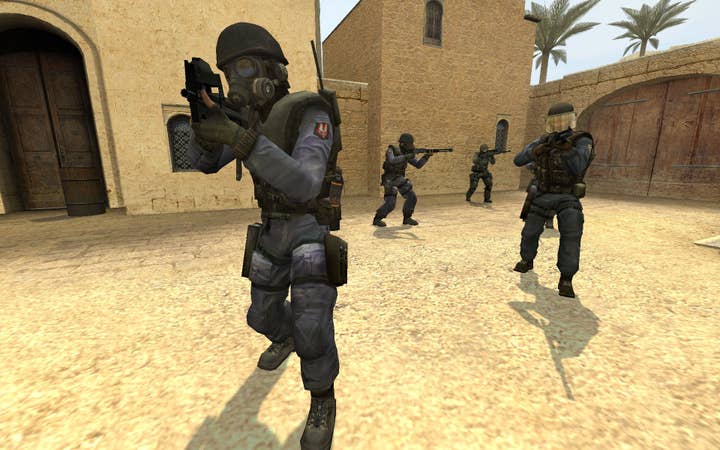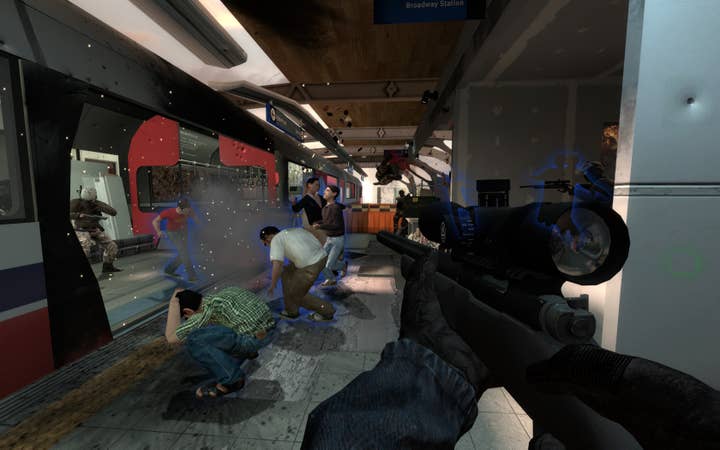Counter Strike, free-to-play and the future of the FPS
Minh Le, co-creator of Counter Strike, on the problems facing his latest project and the end of innovation in first-person shooters
Fame and influence don't always go hand-in-hand, and Minh Le is walking, talking proof of that fact. As the co-creator of Counter Strike, Le was responsible for one of the biggest evolutionary leaps in the industry's most popular genre; a game important as Quake or Half-Life to the development of the modern first-person shooter, and an important milestone for the growing popularity of e-sports.
"A lot of players were really turned off by the fact that Tactical Intervention wasn't on Steam. They didn't even want to install it"
Le is attending Barcelona's Gamelab conference to speak about the challenges facing contemporary developers working with multiplayer shooters, and he is uniquely placed to comment. Not just because of the huge success of his 1999 Half-Life mod, but because of the ambiguous fortunes of his latest project: Tactical Intervention, an online FPS five years in the making. Indeed, Le moved to South Korea from his native Canada in 2008 to secure funding from a local publisher called OGPlanet - a considerable personal sacrifice for Le, and one that didn't pay off as he had hoped.
Tactical Intervention launched in March this year, and its servers were closed in June. The players simply didn't turn up.
"We were publishing in North America with a publisher that was mainly geared towards casual games," Le says when I meet him just before his talk. "They were kind of disappointed with the numbers we were getting. We weren't getting a lot of player retention. The publisher felt that, in order to get that retention, it would involve a lot more money to promote the game. We came to a mutual agreement. It's probably not the best thing to be working with a publisher that doesn't cater to hardcore FPS games."

But Tactical Intervention is far from dead. Le recently signed with the German publisher RNTS, which plans to relaunch the game globally through Steam. This, Le believes, will correct one of the problems that most undermined Tactical Intervention's chances of success on its first attempt.
"We found that a lot of the players were really turned off by the fact that it wasn't on Steam," he says. "They were really against installing a separate launcher and that sort of thing. It was a huge problem for us to convince people to play our game, because they didn't even want to install it."
While Le can understand the PC gaming community's loyalty to Steam - he praises Valve's platform for convenience and user-friendliness - he believes that their devotion has created a sort of tacit monopoly in the market. Simply: if you aren't on Steam, your chances of success are exponentially worse; a significant proportion of the audience won't even contemplate playing outside of its confines.
"All I wanted was to explore new mechanisms in game design, but having that aspect of free-to-play really did put a burden on development"
And the decision to go it alone was taken due to another disruptive force to emerge since the release of Counter Strike: free-to-play. When Le first approached Steam about supporting Tactical Intervention three years ago, it hadn't yet embraced the business model that was rapidly changing the way that games were developed, sold and played. Today, things are different, but at the time OGPlanet left Le with no other option.
"It was not my decision. It was someone higher up," he says. "They were really adamant about going down the free-to-play route. They really felt that the future of the industry had shifted, and in order for a game like ours to exist we had to explore this avenue of monetisation. Initially, when I started the game, I really wanted it to just be a standalone product, much like Counter Strike, but they convinced me that there's just so many games out there that it's really hard to find a market space without free-to-play."
Speaking to Le about free-to-play now, it's clear that he has problems with the model on pretty much every level. He believes that the core audience for a game like Tactical Intervention still nurtures a strong aversion to free-to-play games - another important factor in its struggle to find a large enough audience. "People will just not play our game for that reason, regardless of how interesting it is," he says. "It's frustrating trying to make a game when your business model is driving them away. I'd rather they didn't play the game because it sucks. As a developer, I just want them to give it a shot and, if they don't like it, leave for that reason - not the business model."
Nevertheless, Le offers sympathy for their position. As a consumer, he places himself in the same part of the market: the old-school, the hardcore, who nourished their hobby in times when all the cost of purchasing was up-front. Beyond the ever-present concern over 'pay-to-win' mechanics - something Le fought throughout Tactical Intervention's development - Le noticed compromises that seemed inevitable with building an economy into a game's design. At some point, free-to-play developers will be compelled to make different choices to developers for whom micro-payments are not a concern.

"There were certain aspects of the game design where I had to cut some features, or just not implement them. It was frustrating, because, as a game designer, you don't want to be limited by these external forces," he says. "All I wanted was to explore new mechanisms in game design, but having that aspect of free-to-play really did put a burden on development. For the most part, though, it wasn't so much that I couldn't achieve what I wanted to do."
"I think we've really explored the limits of how we can innovate in the FPS. There are little things that can be done, but I can't see where the big changes will come from"
And the question of achievement is a more difficult subject for Le than when he started Tactical Intervention. Counter Strike wasn't created with innovation in mind, but in looking for fun in the first-person shooter at that time Le was able to create something revolutionary. Today, however, the genre has matured to the point where the vast majority of new releases are essentially riffs on a small handful of classic designs - Counter Strike among them. Indeed, Le questions whether the creative leaps taken by games like Quake and Half-Life will ever be replicated within the FPS again.
"In this day and age, I don't think that can happen. I think we've really explored the limits of how we can innovate in the genre," he says. "There are little things that can be done, and graphical improvements as always, but for the most part I can't see where the big changes will come from. I'm always asking myself, 'What else can we do that really hasn't been done before?' I've run out of things to experiment with. The genre really has matured.
"If you ask me today about doing another FPS, honestly, no, I don't think I will. But when I started Tactical Intervention I thought there was a window of opportunity to evolve the shooter. These days, with games like Battlefield and Call of Duty taking all the mind-share through the sheer amount of money they're backed up with in promotion... I mean, they're great games in and of themselves, but for a smaller company trying to develop a game that's different to that, you can't really rely on your differences for success. The challenge is all about driving players into your game. Pulling players away from these games would require huge amounts of marketing and promotion.
"I do wonder about why the number of FPS players hasn't decreased, but the answer is that there's always a new generation that hasn't played those games. The audience peaked a few years ago, but it will never die down to such small numbers that the industry won't make any more."









